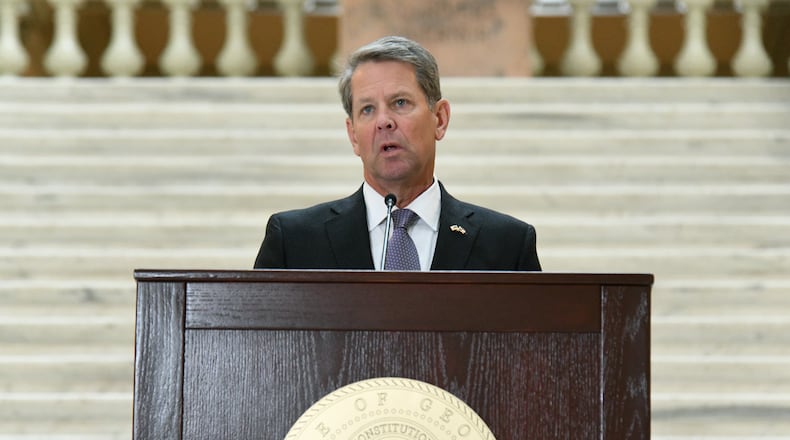Gov. Brian Kemp threatened to go to court to block President Joe Biden’s new federal vaccine requirements, the most expansive steps yet taken by the Democrat’s administration to contain a surging coronavirus pandemic.
Kemp said Thursday that he will “pursue every legal option available to the state of Georgia to stop this blatantly unlawful overreach by the Biden administration” shortly after the president announced plans that could affect as many as 100 million Americans.
The new rules mandate that private-sector businesses with more than 100 workers require their staffers be vaccinated or tested regularly for COVID-19, which is estimated to affect roughly 80 million Americans. An additional 17 million workers at health care facilities that receive federal medical funding would have to be vaccinated.
Separately, Biden also signed an order to require that federal executive branch employees and contractors be vaccinated.
Though about 53% of Americans are now fully vaccinated, Georgia’s inoculation rate ranks among the lowest in the nation, with roughly 45% of the state’s residents fully vaccinated.
Fueled by the highly infectious delta variant, the number of COVID-19 cases exploded during August, straining health care facilities and forcing some hospitals to cancel “nonessential” surgeries such as joint replacements and hernia repairs.
All but a few dozen intensive care units in Georgia have been filled, and state health data showed patients seriously ill with COVID-19 made up 34% of those hospitalized. The vast majority of the 5,935 COVID-19 patients in Georgia hospitals are unvaccinated.
In remarks at the White House, Biden criticized the roughly 80 million Americans who have not yet been vaccinated in forceful terms, saying their “refusal has cost all of us.”
Kemp, who faces reelection next year, has joined other Republican leaders in the Deep South in opposing vaccine requirements and mask mandates. Instead, he’s encouraged Georgians to consult with their medical providers and get the vaccine.
The governor has recently taken steps to boost the ranks of state-financed health care staffers and offer incentives to state employees who have been vaccinated. But despite pressure from public health experts to take additional steps, he’s warned that more aggressive action would backfire.
“You can lead a horse to water, but you can’t make them drink. I mean, that is not the government’s role,” Kemp said recently when pressed on why he wasn’t pursuing mandates or other requirements. “Our role is to educate people and to tell them the truth.”
Kemp has also refused calls from some conservatives to block local school systems from requiring masks and businesses from instituting vaccine mandates, saying he believes in local control and that he is not “going to tell private companies what to do.”
More than half of Georgia’s public school students live in districts that require face coverings, and large employers such as the Walt Disney Co., Emory Healthcare, UPS and the Wellstar Health System have announced vaccine requirements for many employees.
Delta Air Lines recently said it plans to charge employees who haven’t been vaccinated against COVID-19 an extra $200 a month beginning in November as part of the company’s health care plans. The Atlanta-based airline also said earlier it would require new hires to be vaccinated.
Attorney General Chris Carr, a Republican also running for another term next year, also criticized the Biden administration’s vaccine rules and vowed to defend “the citizens and businesses of Georgia from this latest example of federal overreach.”
Still, it’s not clear what legal action Kemp and his allies could pursue.
Anthony Michael Kreis, a Georgia State University constitutional law professor, said there’s “not a thing Georgia can do to thwart” the federal vaccine requirements unless the state seeks to undercut workplace rights established by a 1941 U.S. Supreme Court ruling. He called Kemp’s threat “pure political puffery.”
“If the governor is truly sincere in his statement that he thinks there’s something unlawful in this, he’ll have to answer what other federal workplace safety regulations are unlawful,” the professor said.
“Should we permit society to go back to a time where people were losing limbs to unsafe, unregulated workplace practices,” Kreis said, “or do we adhere to a long-standing social contract of workplace rights?”
Staff writer Matt Kempner and The Associated Press contributed to this article.
About the Author
The Latest
Featured




